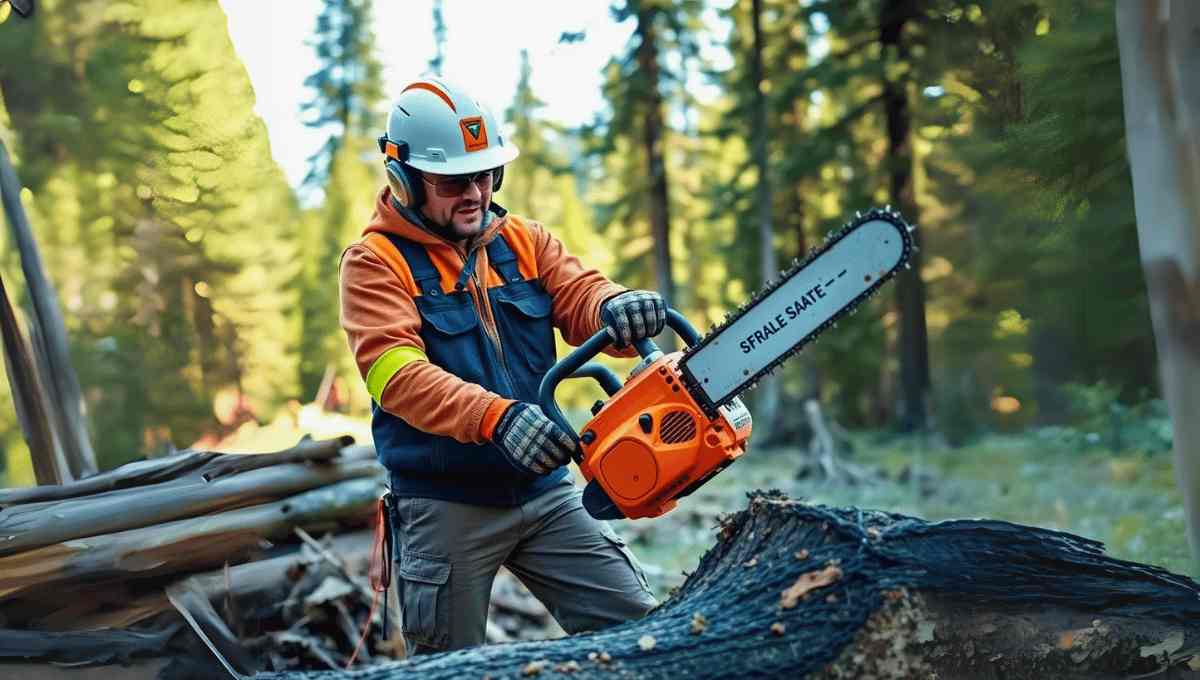Using chainsaws in Bonner County comes with guidelines designed to ensure safety, reduce noise pollution, and protect the environment. If you’re planning to fire up your chainsaw for personal, commercial, or forestry purposes in this area, understanding the “Bonner Count law on using chainsaws” is essential. Below, we dive into the key aspects of these regulations, practical safety measures, and tips to operate responsibly.
Chainsaws can be incredibly useful for clearing land, chopping wood, and managing rural properties. However, with such powerful equipment, safety and respect for the community and environment are crucial. Bonner Count law on using chainsaws outlines these requirements to keep operators safe, promote fire prevention, and ensure noise levels are reasonable.
These laws cover various aspects, from when and where chainsaws can be used to specific safety gear requirements.
Table of Contents
Permit Requirements for Chainsaw Operation
Do You Need a Permit for Chainsaws in Bonner County?
For the average homeowner, a permit isn’t generally required for operating a chainsaw on private property. However, things change when you move to public lands, designated forestry areas, or engage in certain activities, like commercial logging. The county enforces specific permit requirements for individuals and companies working in forestry, particularly during peak seasons when fire risk is high.
Seasonal and Public Land Restrictions
Bonner Count law on using chainsaws is particularly stringent during the fire season, usually from late spring through early fall. During this period, special permits are often required to prevent fire hazards, and additional restrictions may apply on public lands. These measures aim to protect public forests and reduce the risk of forest fires during hot, dry months.
Noise and Environmental Impact Regulations
Understanding Noise Restrictions
Chainsaws are loud by nature, but Bonner County encourages users to be mindful of noise restrictions, particularly in residential and rural communities. Generally, chainsaws should only be operated during reasonable hours, typically between 8 a.m. and 8 p.m. Adhering to these noise regulations helps maintain community peace and minimizes disturbances to neighbors.
Environmental Considerations for Chainsaw Use
Besides noise control, Bonner County also emphasizes minimizing the environmental impact of chainsaw use. If you’re working in rural or forested areas, it’s crucial to respect the local wildlife and plant life. Avoid unnecessary cutting or disrupting habitats, and try to limit chainsaw use during nesting seasons. By being mindful of environmental regulations, you contribute to a balanced ecosystem.
Chainsaw Safety Standards and Required Gear
Essential Personal Protective Equipment (PPE)
Safety is paramount when operating a chainsaw, and the Bonner Count law on using chainsaws mandates specific personal protective equipment. This includes:
- Helmet and Eye Protection: To prevent head and eye injuries.
- Hearing Protection: Chainsaws can produce sound over 100 decibels.
- Heavy-duty Gloves and Boots: Essential for grip and foot protection.
- Chainsaw Chaps or Pants: To protect legs from accidental cuts.
Wearing the correct gear reduces the risk of serious injury and ensures you’re in compliance with local regulations.
Chainsaw Maintenance and Safety Checks
Proper maintenance keeps your chainsaw running safely and efficiently. Regular tasks include checking the chain tension, sharpening the chain, and keeping the saw clean and lubricated. Before each use, inspect the chainsaw to ensure it’s in good working order. Keeping up with maintenance not only prolongs the life of your equipment but also minimizes risks during operation.
Fire Prevention and Risk Management
Fire Safety Practices in Rural Areas
Using a chainsaw in rural areas requires extra caution, especially during dry months when the fire risk is high. To prevent accidental fires, keep a bucket of water or a fire extinguisher nearby when operating your chainsaw. Also, clear any flammable materials like dry leaves, twigs, or brush from the immediate area before you begin cutting.
Chainsaw Use During Fire Season
During the fire season, Bonner Count law on using chainsaws includes additional restrictions. These can range from complete bans during red-flag warnings to specified hours of operation to reduce fire risks. Being aware of and compliant with these rules is essential to prevent accidental fires.
Consequences of Violating Chainsaw Regulations
Fines and Penalties
Failing to adhere to Bonner County’s chainsaw regulations can result in fines and legal penalties. For instance, operating a chainsaw without the proper permits in restricted areas or ignoring noise restrictions may lead to citations. It’s best to familiarize yourself with local laws to avoid any unwanted fines or complications.
Liability and Insurance Requirements
In some cases, particularly for commercial operators, liability insurance is required to cover potential risks associated with chainsaw use. This insurance can protect you financially if an accident occurs or if you inadvertently cause damage to public property. Checking local insurance requirements can save you significant trouble in the long run.
Tips for Legal and Responsible Chainsaw Use
Chainsaw Etiquette and Respect for Neighbors
When operating a chainsaw, being considerate of your neighbors can make a big difference. Avoid early morning or late-night operations, especially in residential or semi-rural areas. Keeping to daytime hours and informing your neighbors about any extended projects can go a long way in fostering good relations and preventing noise complaints.
Checklist for Safe and Compliant Operation
To keep things simple, here’s a checklist to ensure you’re operating your chainsaw legally and safely:
- Check for Permit Requirements: Are you on public land, or is it fire season?
- Observe Noise Regulations: Stick to reasonable hours.
- Prepare Safety Gear: Make sure all protective equipment is ready.
- Inspect Your Chainsaw: Run a quick maintenance check.
- Clear the Area: Remove any flammable materials nearby.
- Communicate with Neighbors: A heads-up goes a long way.
Conclusion
Understanding Bonner Count law on using chainsaws helps keep you, your neighbors, and the environment safe. Following these regulations requires careful attention to permitting rules, noise ordinances, and seasonal restrictions, especially in high-risk fire areas. Using proper safety gear and keeping up with chainsaw maintenance are essential to operate responsibly and reduce the risk of injury. By respecting the environmental guidelines and being mindful of noise, you can avoid fines, and legal consequences, and build a reputation as a responsible chainsaw operator.
Whether you’re using a chainsaw for personal tasks or professional projects, staying compliant with Bonner Count law on using chainsaws regulations benefits everyone. With the right approach, you can enjoy the utility of your chainsaw while protecting the land and community around you.
FAQ’s
Does Bonner County need any permit to use a chainsaw on privately owned properties?
Generally, Bonner Count law on using chainsaws doesn’t require permits for privately owned properties. However, specific uses, such as commercial logging or work on public lands, may need permits, especially during fire season.
What is the fire safety regarding chainsaw use during fire season in Bonner County?
According to Bonner County law on using chainsaws, additional fire safety measures apply during fire season, including restricted hours and mandatory fire prevention tools on-site, like water buckets or extinguishers.
What’s the penalty for violating chainsaw regulations in Bonner County?
Violating Bonner County law on using chainsaws can result in fines or legal action. Penalties vary based on the infraction, especially for unpermitted use of public land or ignoring seasonal restrictions.
Is it necessary to wear PPE even if I’m only cutting for a few minutes?
Yes, the Bonner County law on using chainsaws encourages PPE use at all times, even for short tasks. Helmets, gloves, and eye protection significantly reduce the risk of injuries, regardless of job length.
Are there noise regulations specifically for chainsaws?
Bonner Count law on using chainsaws includes noise restrictions, particularly in residential areas. Chainsaw operation is typically limited to reasonable daytime hours to minimize neighborhood disturbances.
More Articles
Boost Accident Lawyer Rank with Rapid URL Indexer: An SEO Guide
Boost Your Personal Injury Lawyer Rank with Rapid URL Indexer: A Complete SEO Guide
Boost SEO New York Rank with Rapid URL Indexer
Roofing Rank with Rapid URL Indexer: Achieve Top Rankings with Quick Indexing
Can International SEO Efforts Be Enhanced with Rapid URL Indexer for Faster Global Rankings?
Picas Greenhouse Productions System with Business Central: A Complete Guide for Greenhouse

